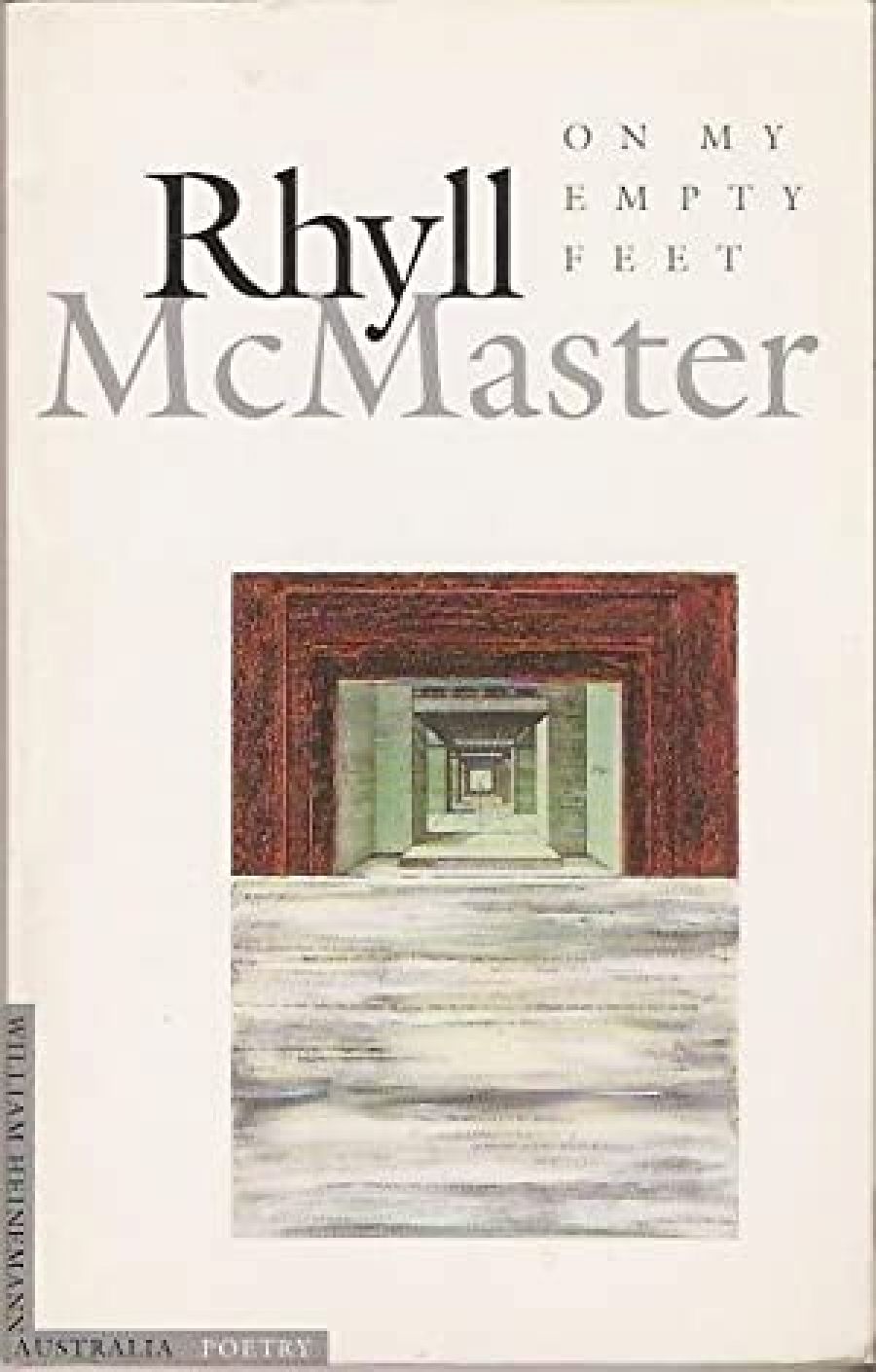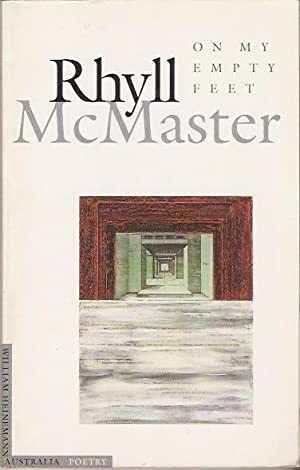
- Free Article: No
- Contents Category: Peter Porter Poetry Prize
- Review Article: Yes
- Article Title: Depends on the ordinary
- Online Only: No
- Custom Highlight Text:
Both of these volumes of poetry claim to deal with the ordinary. Peter Rose’s publisher, Picador, states in its back-cover blurb that the author of The Catullan Rag chooses ‘to focus ... sharply on the urban, the everyday, the seemingly ordinary’, while Heinemann suggests that ‘McMaster has a sure ear for the rhythms of everyday speech’.
- Book 1 Title: On My Empty Feet
- Book 1 Biblio: WHA, $16.95 pb
- Book 1 Cover Small (400 x 600):

- Book 2 Title: The Catullan Rag
- Book 2 Biblio: Picador, $14.95 pb
- Book 2 Cover Small (400 x 600):

Rose’s first book, The House of Vitriol, was an arresting début; there was enough in it to suggest that Rose would quickly develop into a distinctive and highly intelligent voice in Australian poetry. However, it had flaws; the language often had more flash than substance, and I often found an unattractive callousness in Rose’s ready retreat to satiric caricature rather than a genuine attempt at character, and the ensuing empathy that convincing character portrayal demands.
The Catullan Rag indulges all of the vices of his previous volume and has few of its redeeming features. But it does confirm my impression that Rose is a highly talented writer; it’s just that he’s embarked not so much on a poetic journey as a casual stroll down a cul-de-sac in a trendy inner-city suburb.
For this, by and large, is a poetry of gesture and flourish. The language of this poetry preens itself, parades itself as witty and intelligent, yet conveys little that is actually memorable or moving. This is partly due to Rose’s overuse of epithets, particularly erudite ones. What, for instance, are we to make of these lines from ‘The Best of Fleetwood Mac’?:
Now only the uxorious pigeons
captious insight rides the novel air,
affronting limb-locked plane trees;
and a transcendental Spitfire
bombarding our sluttish suburb
with sachets of pink detergent.
In context of the poem, it’s hard to discern tone here. Is this wry and self-satirical, or is it bombastic bilge? A little of both, I suspect; ambiguity of tone is always a good defence against cohesive criticism. And lines like these are not atypical: in various poems, a kiss is ‘mithridatic’, youths ‘unconsonantal’, furniture ‘fabulating’, the sky ‘polycystic’, lungs ‘valetudinarian’, a martini ‘diaphanous’, a vein ‘frigidated’, kitsch ‘heuristic’ and so on. And is the poet merely blowing his nose in ‘Post-Eroica’?: ‘Ursine, paradigmatic, my virus / drags on with this adenoidal rag’.
Rose often counterpoises this pompous use of language with much more mundanephraseology, such as in ‘Circulation’, where his ‘unconsonantal’ twelve-year-olds, ‘garish as supernumeraries’, pounce upon a discarded magazine they suspect to be a Penthouse, only to find ‘one of those fucking weekend magazines’. But such juxtaposition usually serves to sneer at or caricature what we may call ordinary people. For the poet unequivocally situates himself in a world of high art: not a poem goes by without some reference to opera, classical music or literature. Where popular culture does appear, its juxtaposition with ‘real’ culture usually makes it an object or derision; the guitarist of Fleetwood Mac is damned, for instance, as ‘the Seneca of Woodstock’. While the recurring image of music is important for the book’s lyrical quality (Rose has a terrific sense of rhythm), its heavy-handedness tends to close off the book's frame of reference.
All this pose could be forgiven if the poems gave moments of poignancy or insight. Occasionally they do, such as in the haunting, almost disarming ‘Polyphony’. For the most part, though, I find the good poems in The Catullan Rag to be buried under the weight of the volume’s pretensions and the narrowness of its outlook.
Rhyll McMaster shows how it’s done. The poems in On My Empty Feet are a good deal more complex than those in The Catullan Rag, but they engage language which is more lean and precise. On the surface, McMaster’s poetry covers ground that many Australian poets deal with: she’s an imagist, her language is simple and direct, and her subject matter really centres on ordinary experience – childhood memory, domesticity, family relationships. What sets her apart, though, is a voice that is casual but hard-edged, self-critical and never sentimental. These poems resist the temptation to elevate themselves, but are always far more than the sum of McMaster’s observations.
In the first poem, ‘Figure in the Landscape’, McMaster clarifies her method. The poem begins with the sort of vivid visual imagery that characterises much of Australian imagism: ‘A horizon of blue hills / like blistered silk’ and ‘The black, industrial / flame of poplars’ She soon asserts that ‘I am the figure in the landscape / which docs not live / unless I move’. Thereafter, although the poetry localises its landscapes with the sort of accuracy that would be enough for some poets, people become the focus, the defining substance of those landscapes.
The landscapes can be banal, familiar, such as in ‘Bath’ where the woman in the bath sees her toes reflected in the water and wryly concludes, ‘I am a woman of my times, / my best feet /both forwards and backwards’.
The voice of such poems is so attractive in the way in which it keeps the ordinary flexed and tense with the distance of irony. But it’s not a dismissive irony; rather, it heightens the human quality of experience, washing it with an earthy ambivalence. This is nowhere better seen than in the delightful ‘Sea Creatures’, which captures so well those awful childhood visits to the beach that are supposed to be such fun but are actually suffused with trauma. Mother and father have a great time, while their daughter doggedly persists, to conclude, ‘In the will of the moment I believe / I am having dreadful fun’.
The same self-critical, genuine voice is found in poems that examine and translate adult experience, notably in the second section, which deals with the narrator’s mother’s physical decay. The poems gain emotional power from the interplay between love and the terrible frustration, even anger, we feel when watching those we are close to gradually collapse towards death. And snatches of reported speech imbue observation with poignancy:
Her brain is stripped
to its inessentials.
She’s disposed of the gears.
Her mind is full of old shoes
that don’t fit.
Clothes. Which? Which?
She twitches a pair of slacks
over her shoulders.
‘I used to have such lovely … lovely ...
On My Empty Feet is a longer, more ambitious volume than McMaster’s last book, 1986’s Washing the Money. Consequently, it has more failures than that book – poems that don’t resonate or that fail to progress effectively and consistently. Its many successes, though, more than compensate for any blemishes it may possess.


Comments powered by CComment